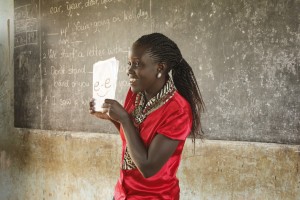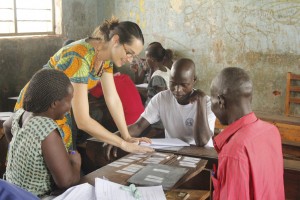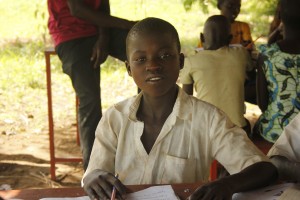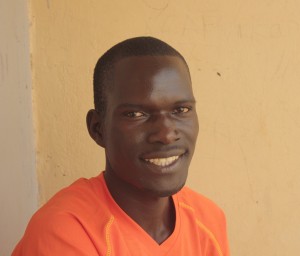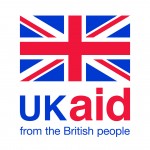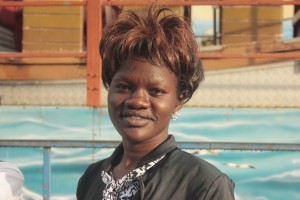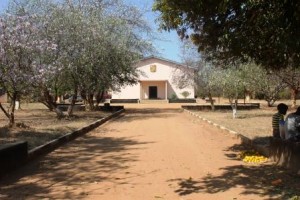Facts about phonics!
June 16, 2016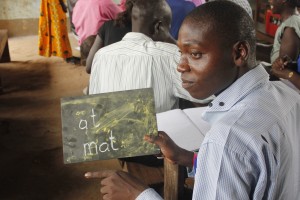 African Revival recently organised a 3- day phonics training for Koch Goma Primary School with phonics trainers Jody Spencer and Akello Catherine. Jody and Catherine used the Fun of Phonics curriculum, which has been adapted by Jody from international phonics programmes to fit the local teaching environment in Uganda. Teachers were trained in a multisensory synthetics phonics approach using actions and song, and practiced using teaching methods such as pair reading.
African Revival recently organised a 3- day phonics training for Koch Goma Primary School with phonics trainers Jody Spencer and Akello Catherine. Jody and Catherine used the Fun of Phonics curriculum, which has been adapted by Jody from international phonics programmes to fit the local teaching environment in Uganda. Teachers were trained in a multisensory synthetics phonics approach using actions and song, and practiced using teaching methods such as pair reading.
But what is phonics? How is it different from teaching children to read using the rote memorization technique? And why is it so effective? Find out all you ever wanted to know about phonics here!
What is phonics?
Phonics is a method of teaching reading and writing that focuses on sounds. In the English language there are only 26 letters in the alphabet, however there are 44 sounds and 120 main ways of writing these sounds. Phonics teaches children to recognise and write these sounds by training them to correlate these different sounds (phonemes) with letters (graphemes).
Phonemes are the smallest units of sound that make up a word.
Take the word ‘star’. While it consists of only one syllable, it contains four different phonemes: /s/ /t/ /a/ /r/. When teaching phonics, children will be taught the sound each phoneme makes, then how to put these sounds together to sound out the whole word.
Some sounds have one letter, while others have two or three. For example, the word ‘fish’ has four letters but only three sounds – the letters ‘sh’ make one sound but are two letters.
Why is phonics an effective teaching method?
A written language is basically a kind of a code. Teaching phonics is just teaching children to crack that code by learning to recognize the sounds of letters and different letter combinations. Children learn the simple bits first and then easily progress to get the hang of the trickier bits. Phonics gives children the skills to decode new words that they have not been taught by sounding them out, therefore equipping them with the skills to read and write independently.
Yes. A study in the UK led by Educational Psychologist Marlynne Grant has shown the effectiveness of phonics instruction at nursery and primary level. The study followed a group of 30 children who were taught using phonics for the first time in nursery, and tracked their progress for three years, to the end of year two in primary school. Grant’s research found that in 2013, members of the year two class of seven-year-olds were on average 28 months ahead of their chronological age for reading and 21 months above their age for spelling.
Why is rote learning not effective?
Rote learning is a memorisation technique centred on repetition and cramming. It is based on the idea that the more a child repeats a piece of information, the quicker they will be able to recall it. However, this quick recall often comes at the expense of a deeper understanding because rote learning does not focus on comprehension.
In Uganda, pupils are often taught English using this rote learning method. Children are taught to repeat and memorize particular sentences and words, but are not taught how to decipher specific sounds in words. This means that some children can read words they have already been taught, but cannot tackle new words on their own. Other children, however, find it difficult to memorize words and can progress through primary school with a limited reading ability. Many children leave primary school without being able to read independently when taught using rote memorization.
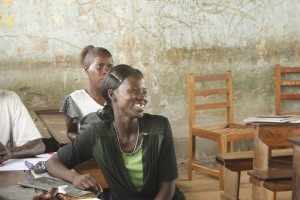 What are literacy levels in Uganda?
What are literacy levels in Uganda?
Across Uganda, one third of youth are illiterate and pass rates for English amongst children aged 10-16 are only 47% (Uwezo). In many schools, especially those in poorer rural areas, quality of education remains poor and teachers lack practical skills and educational resources. Many children leave school without the ability to read simple sentences that they have not already been taught.
Why does literacy matter?
Children’s poor skills in reading and writing have a direct result on their results in other academic subjects such as mathematics and science because the main academic language for exams in primary school is English. Children who cannot read and understand questions for these subjects often perform poorly in exams and do not develop literacy skills vital for success in the workplace and beyond.
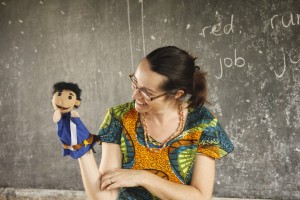 How can training teachers in phonics help improve literacy levels?
How can training teachers in phonics help improve literacy levels?
The root cause of illiteracy is the way teachers are trained in Uganda. In general, they are taught to use rote memorisation to train pupils to read and write, often graduating from Primary Teaching College without being confident in teaching English. In some rural schools, some teachers struggle with the English language themselves following years of poor instruction, so struggle to teach the language in the classroom. Moreover, they lack skills in effective, research-based teaching methods which engage learners. By training teachers in phonics methodology, they will be equipped with the skills to teach children how to decode new words and give them the framework to independently develop their literacy level. Strong literacy skills will help students to improve their performance in other subject areas, with general comprehension across subjects enhanced by the ability to read and write well.
Posted in News | Tagged African Revival, Changemaker, Development, ECD, Education, Gulu, inspiration, Inspiring Head Teacher, International Development, Jumpstart!, Nursery School, School Development, Teacher training | Leave a commentIntroducing Speed School!
May 5, 2016
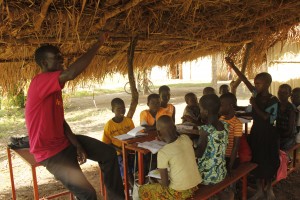 In rural Nwoya district, Northern Uganda, many children are not in school. Some have dropped out – others have never been to school at all. The reasons for dropping out are myriad. Some families do not have enough money to pay the fees for multiple children at school, as well as school uniform and scholastic materials. Other children are required to stay at home to care for sick relatives or help with household chores.
In rural Nwoya district, Northern Uganda, many children are not in school. Some have dropped out – others have never been to school at all. The reasons for dropping out are myriad. Some families do not have enough money to pay the fees for multiple children at school, as well as school uniform and scholastic materials. Other children are required to stay at home to care for sick relatives or help with household chores.
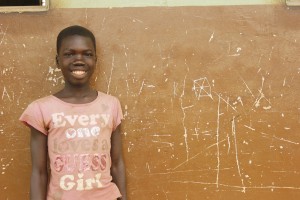 Molly (right) is one young girl who, at 13 years old, had never been to school until she enrolled in Speed School. Her uncle, who she lives with, did not allow her to go to school; instead she stayed at home to do most of the cooking and cleaning. And hers is not an isolated case. Sarah, also 13, had to drop out of school when her father spent all the money meant for school fees on the bride price for Sarah’s step mother. Paying dowry is still a tradition in northern Uganda and often impoverishes families. After the money had been used on his new bride, Sarah’s father asked her and her 4 siblings to stay at home until he found the money for their education. 3 are now enrolled in Speed School, which is a free initiative.
Molly (right) is one young girl who, at 13 years old, had never been to school until she enrolled in Speed School. Her uncle, who she lives with, did not allow her to go to school; instead she stayed at home to do most of the cooking and cleaning. And hers is not an isolated case. Sarah, also 13, had to drop out of school when her father spent all the money meant for school fees on the bride price for Sarah’s step mother. Paying dowry is still a tradition in northern Uganda and often impoverishes families. After the money had been used on his new bride, Sarah’s father asked her and her 4 siblings to stay at home until he found the money for their education. 3 are now enrolled in Speed School, which is a free initiative.
The reasons why children have dropped out of school are complex and difficult to address. But now a new initiative called Speed School, implemented by African Revival in partnership with Geneva Global, is aiming to get these drop outs back into school. The Speed School programme was previously implemented by Geneva Global in Ethiopia. The project was such a success that it was brought to Uganda and adapted to the national education system. African Revival is now managing 30 Speed School classes, each with 25 pupils. Over one year, we aim to educate and reintroduce 750 pupils into mainstream education and address the root causes of primary school drop outs and absenteeism.
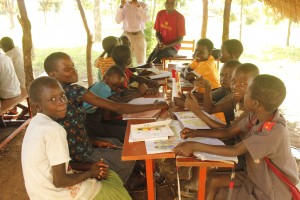 Speed School is an accelerated learning programme which will teach children the first 3 years of the primary curriculum, after which they will re-join the formal education system in Grade 4. Children are taught using effective participatory and child-centred learning methods which the Speed School teachers (called facilitators) learned during an intensive training session at the start of the project. The facilitators are also taught different ways to lesson plan, make learning aids, and encouraged to place an emphasis on critical thinking skills in class. Reduced class sizes of 25 pupils (the average teacher-pupil ratio in government schools is 1:80) also makes classes easier to manage and improves behaviour and pupil motivation. Moreover, the facilitators are from the local community, so as well as teaching the condensed curriculum, they can also monitor their pupils to ensure that they stay in Speed School and do not drop out again.
Speed School is an accelerated learning programme which will teach children the first 3 years of the primary curriculum, after which they will re-join the formal education system in Grade 4. Children are taught using effective participatory and child-centred learning methods which the Speed School teachers (called facilitators) learned during an intensive training session at the start of the project. The facilitators are also taught different ways to lesson plan, make learning aids, and encouraged to place an emphasis on critical thinking skills in class. Reduced class sizes of 25 pupils (the average teacher-pupil ratio in government schools is 1:80) also makes classes easier to manage and improves behaviour and pupil motivation. Moreover, the facilitators are from the local community, so as well as teaching the condensed curriculum, they can also monitor their pupils to ensure that they stay in Speed School and do not drop out again.
As well as Speed School classes, Geneva Global have also established self-help groups for the parents of the enrolled pupils. In these groups parents – primarily mothers – will be trained in Income Generating Activities to economically empower them so they are able to meet the financial demands of educating their children. These activities may include Village Savings and Loans Associations (VSLA), agriculture or business activities.
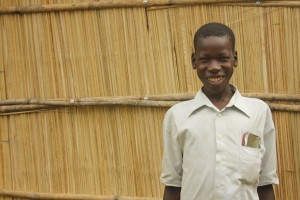 By ensuring the parents are empowered economically, the Speed School programme aims to address one of the main reasons why children dropped out of school in the first place: lack of money for school fees. Even if parents want their children to gain an education, school is not always a priority. Richard, a bright-eyed 13 year-old, dropped out of school in 2012 because both of his parents had died. He now lives with his grandmother, and has a hand-to-mouth existence: his grandmother is frail and can only generate enough money to feed Richard. No money is left for school fees. But now Speed School is helping Richard to study again and get an education, so one day he can achieve his dream of becoming a pilot: “I want to be a pilot so I can move in different places, and learning ways of living and different cultures”. Motivated and focus, we are sure Richard, along with the other children in Speed School, will excel this year in this supportive programme and go on to succeed in the future.
By ensuring the parents are empowered economically, the Speed School programme aims to address one of the main reasons why children dropped out of school in the first place: lack of money for school fees. Even if parents want their children to gain an education, school is not always a priority. Richard, a bright-eyed 13 year-old, dropped out of school in 2012 because both of his parents had died. He now lives with his grandmother, and has a hand-to-mouth existence: his grandmother is frail and can only generate enough money to feed Richard. No money is left for school fees. But now Speed School is helping Richard to study again and get an education, so one day he can achieve his dream of becoming a pilot: “I want to be a pilot so I can move in different places, and learning ways of living and different cultures”. Motivated and focus, we are sure Richard, along with the other children in Speed School, will excel this year in this supportive programme and go on to succeed in the future.
Why are community contributions to construction projects so important?
April 11, 2016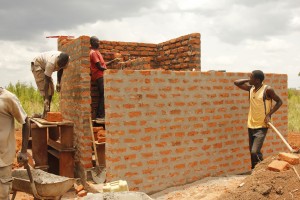 At African Revival, we always ask the communities who benefit from our construction projects to make a contribution. This can be either financial or in the form of labour and resources. But why ask for this contribution? Why is it important for the success of the project? In this article, we explore the benefits of community contribution and ask Construction Coordinator Vincent about what motivates parents to contribute.
At African Revival, we always ask the communities who benefit from our construction projects to make a contribution. This can be either financial or in the form of labour and resources. But why ask for this contribution? Why is it important for the success of the project? In this article, we explore the benefits of community contribution and ask Construction Coordinator Vincent about what motivates parents to contribute.
When an outside organisation comes into a rural community to work on a construction project, there is a risk that the community members see the building as belonging to an outside agency. Often this means that they do not have a feeling of responsibility towards it and in many cases do not properly maintain it. They see this as the duty of the outside organisation. This can mean construction projects fall into disrepair and are not sustainable in the long term.
In order for the community to properly maintain a building, they must feel some sense of ownership towards it. Community contribution of money, labour or resources can help generate this sense of ownership and make a project more sustainable, as Construction Coordinator Vincent explains: “If the community make a contribution, the sense of ownership gets into them. In most interventions that have been going on in the construction industry, we realise that after a while the community still doesn’t own the place, even if you hand over officially to them. So we want them to own the latrine, right from the onset”
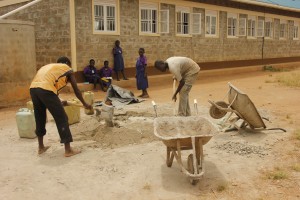 This sense of ownership can be generated by involving the community members right from the start, by consulting them about their real needs, involving them in the planning process and asking them what they can realistically contribute. A community in a rural setting may want to contribute building materials sourced from the local environment, which costs them nothing, while a town-based community may not have access to natural building materials and may choose instead to contribute in cash. Whatever the contribution, it encourages a sense of duty and pride towards the new facility, as Vincent describes: “If they contribute, the community feels more ownership than when someone just gives it to them. So that means if the facilities are completed they will take care of it. They will try to see that nobody messes it up. If there is any burglary, they are willing to take care of the security. They rejoice at the end of the day that this is their labour, their contribution. They feel proud that they have contributed for the construction of a classroom, now their children are able to use the facility”
This sense of ownership can be generated by involving the community members right from the start, by consulting them about their real needs, involving them in the planning process and asking them what they can realistically contribute. A community in a rural setting may want to contribute building materials sourced from the local environment, which costs them nothing, while a town-based community may not have access to natural building materials and may choose instead to contribute in cash. Whatever the contribution, it encourages a sense of duty and pride towards the new facility, as Vincent describes: “If they contribute, the community feels more ownership than when someone just gives it to them. So that means if the facilities are completed they will take care of it. They will try to see that nobody messes it up. If there is any burglary, they are willing to take care of the security. They rejoice at the end of the day that this is their labour, their contribution. They feel proud that they have contributed for the construction of a classroom, now their children are able to use the facility”
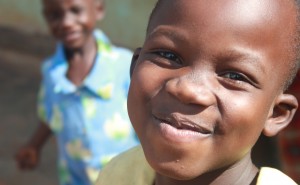 Voluntary provision of labour, time, money and materials can also help to break patterns of dependency and passivity. If the community knows that in order to benefit from a construction project, they will also need to contribute, this can help to counteract a hand-out culture inspired by decades of free projects and facilities. Involving a community in the planning and implementation process can also empower individuals by giving them decision-making power over their own futures, as well as imparting new knowledge and skills – for instance knowledge about proper planning or new construction skills. All these factors contribute to the long term sustainability of the project by encouraging responsibility amongst the community and giving them the skills they need to properly maintain a construction project.
Voluntary provision of labour, time, money and materials can also help to break patterns of dependency and passivity. If the community knows that in order to benefit from a construction project, they will also need to contribute, this can help to counteract a hand-out culture inspired by decades of free projects and facilities. Involving a community in the planning and implementation process can also empower individuals by giving them decision-making power over their own futures, as well as imparting new knowledge and skills – for instance knowledge about proper planning or new construction skills. All these factors contribute to the long term sustainability of the project by encouraging responsibility amongst the community and giving them the skills they need to properly maintain a construction project.
But what motivates a community to contribute? According to Vincent, it is a desire to see the best for all the members of that community, and in the case of school construction projects, a better future for their children:“Some may want their children to be in a safe environment. If the environment is good, that means the education is better. Most importantly, it is about the future of the children who attend the school. The community want to see a child have a better future. If there is anything that they can do, like development fees, like personal labour – that is the driving force that makes community members give contributions”
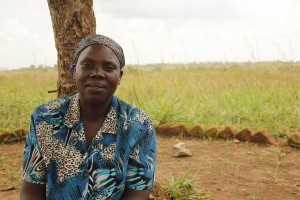 Community member Christine, a parent at Teddi Community School where African Revival recently constructed a new block of latrines, agrees: “We don’t contribute because of a penalty or a demand. We contribute because we want to see this school and community development and want to be part of that process.” At Teddi, the parents contributed 1000UGX for each of their children enrolled at the school. They also signed a maintenance agreement with African Revival, which hands over responsibility for all upkeep to the School Management Committee. While we will always be there to offer support to this particular community, they are motivated to care for the facility because it has improved sanitation at the school, especially for the female pupils, as parent Sharon explains: “I was happy to contribute to the latrine. Now our girls have more privacy”.
Community member Christine, a parent at Teddi Community School where African Revival recently constructed a new block of latrines, agrees: “We don’t contribute because of a penalty or a demand. We contribute because we want to see this school and community development and want to be part of that process.” At Teddi, the parents contributed 1000UGX for each of their children enrolled at the school. They also signed a maintenance agreement with African Revival, which hands over responsibility for all upkeep to the School Management Committee. While we will always be there to offer support to this particular community, they are motivated to care for the facility because it has improved sanitation at the school, especially for the female pupils, as parent Sharon explains: “I was happy to contribute to the latrine. Now our girls have more privacy”.
Overall, community contribution to construction projects ensures the long term sustainability of that project, while also giving communities more authority over their own development and futures.
Posted in News | Tagged African Revival, community contribution, community development, Development, Education, Gulu, inspiration, International Development, Lord's Resistance Army, School Development, Teacher training | Leave a comment
Sunday: Community Innovator
February 23, 2016
Sunday is only 22 years old, yet already he is the headteacher of Lacek Community School in Nwoya district! To hold such an important position at such a young age is testimony to both his considerable talents as a teacher and to how highly he is considered in the surrounding community. But Sunday is not just a Headteacher. He is also participating in the Teacher Changemaker network, which we coordinate in partnership with STIR Education in Northern Uganda! So far, Sunday has implemented an incredibly successful Village Savings and Loans Association in Lacek School (they have saved an impressive 3,775,400 since May) which is also helping to bring parents closer to the school to monitor their children’s education, improving student motivation and performance. Read on to discover how Sunday is changing the way the local community views education and impacting on the next generation at Lacek Community School!
My parents were escaping from the Lord’s Resistence Army, so I was born in Gulu. But our original homeland is in Kinene. We moved back to Kinene in 2006 when the war ended. I was 13 years old. I have only 3 brothers without any girls. My mother gave birth to 4 girls but they all passed away. There were only 4 boys left. I have four half brothers and sisters from my fathers second wife. We all live together in Kinene. My father had many wives, almost 11. He is 80 years old now.
Teaching became interesting to me because of a certain teacher in my primary, called Mr Laloo. That teacher really made me who I am. I struggled to learn English, so he put a lot of work into teaching me how to speak and write well. I liked the way he taught me, and I promised to myself I would become a teacher.
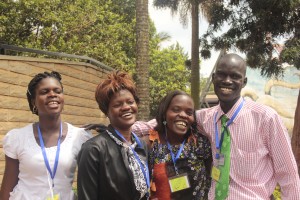 Being part of the Teacher Changemaker network made me realise that the problem in our schools is parent engagement. It touches me. There is a lack of parent engagement in these communities – parents have very negative attitudes towards education. I saw that many were not able to pay their children in school. I sat down with the School Management Committees and asked, which is the best way we can help these parents? I decided to bring the Village Savings and Loans Association (VSLA), which other localities are doing successfully. When they save money for 2 months, that money alone is able to pay the school fees for their children. So I decided to mobilize parents. Many parents joined me. Every week they come and save their money in the pool. So far they have saved 3,775,400 (since May 2015).
Being part of the Teacher Changemaker network made me realise that the problem in our schools is parent engagement. It touches me. There is a lack of parent engagement in these communities – parents have very negative attitudes towards education. I saw that many were not able to pay their children in school. I sat down with the School Management Committees and asked, which is the best way we can help these parents? I decided to bring the Village Savings and Loans Association (VSLA), which other localities are doing successfully. When they save money for 2 months, that money alone is able to pay the school fees for their children. So I decided to mobilize parents. Many parents joined me. Every week they come and save their money in the pool. So far they have saved 3,775,400 (since May 2015).
Children are getting benefits from their parents being in the VSLA. Their parents can borrow money and pay them, buy for them uniform, the scholastic materials. Also, the parents are able to monitor their children, whether they are in the class, whether they are learning. They first move around all the school compound checking what is wrong, what is good, and they feedback later.
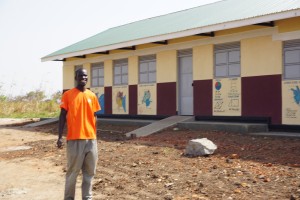 In our culture, when you are a teacher, people prefer to be like you, because teachers are able to make unknown known. So people take teachers as the most important thing for the community. The change makers. Whenever there are any problems they first consult the teacher. During village meetings, I am always the chief’s guest when they are making bylaws. I help them to decide which ways to manage the schools and build the community. And when we are making school rules, we invite the chiefs to help. So when the child is not at school, we can give a phone call to the chief to inform him about the problem within his area of service.
In our culture, when you are a teacher, people prefer to be like you, because teachers are able to make unknown known. So people take teachers as the most important thing for the community. The change makers. Whenever there are any problems they first consult the teacher. During village meetings, I am always the chief’s guest when they are making bylaws. I help them to decide which ways to manage the schools and build the community. And when we are making school rules, we invite the chiefs to help. So when the child is not at school, we can give a phone call to the chief to inform him about the problem within his area of service.
I am getting some great advice from the network, like its OK to make mistakes. For us we take mistakes as a very bad thing. When we make mistakes in the Ugandan education system, people do not like it. But when I see anyone making mistakes, I just help them, and do not tell them off. The network always tells us that through mistakes, you can learn.
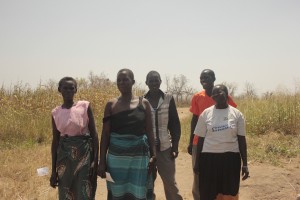 The part of the network that has motivated me a lot is friendship. Before, I didn’t know any of the other teachers in Nwoya district who are now in the network. I speak with my friend Gino (a pre-primary teacher at Purongo Hill Primary School) by phone almost daily. We just call each other and share the things from our day.
The part of the network that has motivated me a lot is friendship. Before, I didn’t know any of the other teachers in Nwoya district who are now in the network. I speak with my friend Gino (a pre-primary teacher at Purongo Hill Primary School) by phone almost daily. We just call each other and share the things from our day.
In the future, after going for my ECD diploma, I’m hoping to be a tutor and train teachers in Early Childhood Development. I can see myself so much specialised in the ECD because I understand young children’s behaviour.
My daughter, she is very stubborn! She is around 2 years old. At around 1 ½ years, she was also able to speak. She acquired language very early. I play with her everyday, even if she is not understanding everything I say. She is called Akello Charity Hope. She loves playing, she plays so much. When I reach home in the evening, we sing songs together. I will arrive and she will immediately come to me to sing songs, to speak funny things. In the future I want her to be like me – a teacher.
Posted in News | Tagged Acholi, African Revival, Changemaker, Development, ECD, Education, endurance, Gulu, Headteacher, inspiration, International Development, Interview, Jumpstart!, Kampala, Nursery, Nursery School, Profile, Pupils, School, School Development, STIREducation, Teacher training, Uganda, World Teachers' Day | Leave a comment
Irene: Tap dancer turned Teacher Changemaker
February 17, 2016Irene started her early career as a tap dancer. Trained for a year by a man from California named Jack, she still has a real passion for the dance with ‘the glass shoes’. Now an Early Childhood Development teacher in Anaka P7 Primary School in Nwoya district, Northern Uganda, she regularly brings song and dance into her lessons as a way of energising her pupils and bringing her classroom alive. This interactive style of teaching is just one of the things she has learned from participating in Teacher Changemaker network, implemented by STIR Education and coordinated in Nwoya district by African Revival.
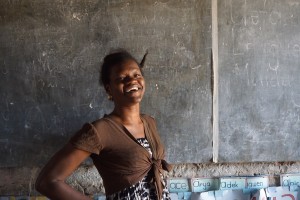 The Teacher Changemaker network encourages teachers across Uganda to introduce ‘micro innovations’, new techniques to increase the quality of education, into their lessons to respond to the challenges they face in the Ugandan education system. For Irene and her colleagues at Anaka P7, one of the main challenges is lack of parental engagement: “We decided that parental engagement is the biggest problem affecting our school. There are parents that, when you call them for a meeting, they don’t want to come. They don’t provide the scholastic materials for their children. You find a child will come to school hungry, without having eaten, and not be able to concentrate in class. Children like this end up failing.” She and her fellow teachers have introduced a procedure to counteract this challenge: “The first step is to call the parents for a meeting. The second stage is to go up to the home to see what is the problem stopping this child from performing. And the time comes when the parents start to listen, slowly, until they are now following the advice of the teacher. We have used this procedure and now there are many who come to check the progress of the children”. This micro innovation is already having positive results. This year, more children in Irene’s class passed, and she has noticed a change in the attitude of her students in class, now their parents are taking more of an interest in their education.
The Teacher Changemaker network encourages teachers across Uganda to introduce ‘micro innovations’, new techniques to increase the quality of education, into their lessons to respond to the challenges they face in the Ugandan education system. For Irene and her colleagues at Anaka P7, one of the main challenges is lack of parental engagement: “We decided that parental engagement is the biggest problem affecting our school. There are parents that, when you call them for a meeting, they don’t want to come. They don’t provide the scholastic materials for their children. You find a child will come to school hungry, without having eaten, and not be able to concentrate in class. Children like this end up failing.” She and her fellow teachers have introduced a procedure to counteract this challenge: “The first step is to call the parents for a meeting. The second stage is to go up to the home to see what is the problem stopping this child from performing. And the time comes when the parents start to listen, slowly, until they are now following the advice of the teacher. We have used this procedure and now there are many who come to check the progress of the children”. This micro innovation is already having positive results. This year, more children in Irene’s class passed, and she has noticed a change in the attitude of her students in class, now their parents are taking more of an interest in their education.
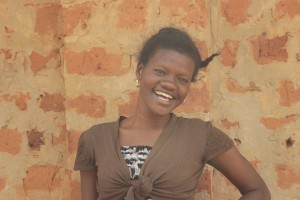 Irene is confident that the innovations and increased focus on critical analysis and problem solving that the Changemaker network has facilitated will continue to have a positive impact on her primary school: “as long as we keep innovations coming to Anaka p7, there will be a great many positive changes. Though we have some parents who don’t listen to the school, in time there will be a lot of improvements because us teachers have learned ways of solving the problems we face”
Irene is confident that the innovations and increased focus on critical analysis and problem solving that the Changemaker network has facilitated will continue to have a positive impact on her primary school: “as long as we keep innovations coming to Anaka p7, there will be a great many positive changes. Though we have some parents who don’t listen to the school, in time there will be a lot of improvements because us teachers have learned ways of solving the problems we face”
The network is also having a positive impact on Irene’s confidence and motivation as a teacher: “The network taught me that, if you are a teacher, you should have confidence in everything you do, you should be exemplary, you should have knowledge, you should be someone who searches for things that will make a change. Someone creative in the mind who will search for ways to make the children learn well and pass”.
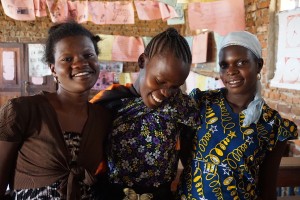 She also enjoys the unity and collaboration with the other Teacher Changemakers, which is a real advantage for all participants. Teaching in any part of the world can be a difficult job, and in Uganda the lack of good infrastructure, teaching materials and training exacerbates the already considerable challenges. By encouraging teachers to share and support each other, the Teacher Changemaker network is looking to alleviate these challenges through an informal support system that allows participants to vocalise their problems and search for solutions together. This style of network also means that innovations produced by the teachers are tailored to the specific localised environments across Uganda, rather than ready-made solutions designed out of context. This contributes to the success of the network and its popularity amongst its Changemakers, especially Irene, who advised teachers to try out the new Changemaker innovations for themselves: “My advice for other teachers is this: go and put the micro innovations into use, because they will help a lot. And help you learn how to communicate with others, discuss, be social and cooperative and many others. When you go back to school tell others to do the same!”
She also enjoys the unity and collaboration with the other Teacher Changemakers, which is a real advantage for all participants. Teaching in any part of the world can be a difficult job, and in Uganda the lack of good infrastructure, teaching materials and training exacerbates the already considerable challenges. By encouraging teachers to share and support each other, the Teacher Changemaker network is looking to alleviate these challenges through an informal support system that allows participants to vocalise their problems and search for solutions together. This style of network also means that innovations produced by the teachers are tailored to the specific localised environments across Uganda, rather than ready-made solutions designed out of context. This contributes to the success of the network and its popularity amongst its Changemakers, especially Irene, who advised teachers to try out the new Changemaker innovations for themselves: “My advice for other teachers is this: go and put the micro innovations into use, because they will help a lot. And help you learn how to communicate with others, discuss, be social and cooperative and many others. When you go back to school tell others to do the same!”
Kevin: Teacher Changemaker!
February 11, 2016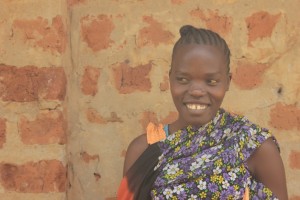 Kevin, aged 23, is a primary teacher from Anaka P7 Primary School, and a fantastic Teacher Changemaker! She is participating in STIR Education’s Teacher Changemaker network, which is designed for teachers to share ideas and innovations, as well as to provide a source of motivation for educators in what can be a difficult working environment. African Revival’s Jumpstart! team has been helping STIR to manage the network in Nwoya district, where we caught up with Kevin to find out how the Changemaker network is benefitting her and her students!
Kevin, aged 23, is a primary teacher from Anaka P7 Primary School, and a fantastic Teacher Changemaker! She is participating in STIR Education’s Teacher Changemaker network, which is designed for teachers to share ideas and innovations, as well as to provide a source of motivation for educators in what can be a difficult working environment. African Revival’s Jumpstart! team has been helping STIR to manage the network in Nwoya district, where we caught up with Kevin to find out how the Changemaker network is benefitting her and her students!
I teach in the primary section of Anaka P7. I like the lower primary classes because they are young and friendly, so I enjoy interacting with them. The Teacher Changemaker network has given me a lot of methods about how to handle children, especially children with behavioural problems. It has given me more skills to handle the stubborn ones, the latecomers, and others with different problems.
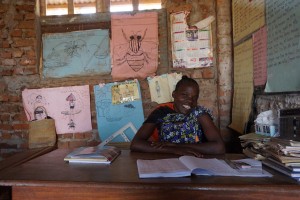 The best thing about being part of the Teacher Changemaker network is that we meet many Changemakers who give us many new skills. I have learnt the qualities of a good teacher, how to handle the classroom situation and how to make the classroom into a good learning environment.
The best thing about being part of the Teacher Changemaker network is that we meet many Changemakers who give us many new skills. I have learnt the qualities of a good teacher, how to handle the classroom situation and how to make the classroom into a good learning environment.
Being a Changemaker means being a teacher who is an all rounder, being a teacher who has a growth mind-set not a fixed mind-set and a teacher who is always ready for anything. As a Changemaker, you have to practice what you preach. You have to be innovative, influential, creative and motivate the learners.
This year I will use one micro innovation that I call ‘I do, we do, you do’. I will first do on my own as the learners watch and learn from me. Then ‘we do’ together. Then ‘you do’ – one particular learner will do as I observe and correct the work. We had some training about this. I’ve tried it before and it always works very well. Even during our teacher training, we do the exercises like this and it’s a nice technique.
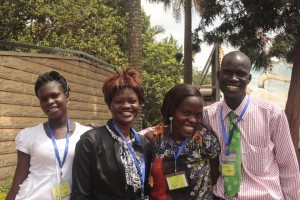 Since being involved in the Teacher Changemaker network, I have one success story about a child who didn’t enjoy learning. The child came from a long distance away, so the problem was lack of lunch, because at school we don’t provide food for the learners. I decided to talk to the parents of the child to make a plan. I started by advising them that in life there is mostly one thing: if the stomach is full, the brain will be open to learning new things, but if the stomach is complaining, the brain is focused on the stomach. The parents followed my advice and sent the child to school with packed lunch. Soon after, the learning behaviour of the child changed – they came to school early and concentrated in class. When the year ended last year, the child passed very well. After I saw the positive progress of the child, I told my fellow Changemakers in my school about the procedure I had used.
Since being involved in the Teacher Changemaker network, I have one success story about a child who didn’t enjoy learning. The child came from a long distance away, so the problem was lack of lunch, because at school we don’t provide food for the learners. I decided to talk to the parents of the child to make a plan. I started by advising them that in life there is mostly one thing: if the stomach is full, the brain will be open to learning new things, but if the stomach is complaining, the brain is focused on the stomach. The parents followed my advice and sent the child to school with packed lunch. Soon after, the learning behaviour of the child changed – they came to school early and concentrated in class. When the year ended last year, the child passed very well. After I saw the positive progress of the child, I told my fellow Changemakers in my school about the procedure I had used.
The happiest moment I have ever had is when I graduated from teaching college. I found that during my school practice I got an A! I celebrated this moment, because it’s the moment I became a qualified teacher.
I want to go to the next level of education. I want to do a degree in primary education. If I can, I’ll try East African International University in Kampala where this year’s STIR Education summit was held. I will work very hard to achieve this goal.
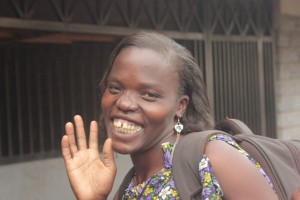 My role model is my dad because he is a teacher, so I’ve also decided to take his profession. He is a head teacher in St.Luke’s Primary School in Nwoya district. I always look at what he does and admire him because he is funny, friendly and nice.
My role model is my dad because he is a teacher, so I’ve also decided to take his profession. He is a head teacher in St.Luke’s Primary School in Nwoya district. I always look at what he does and admire him because he is funny, friendly and nice.
If I could give one piece of advice to a group of people it would be to be comfortable with change. They should not be static. If change comes, they should be open to new things. Like if a new teaching innovation is introduced we should embrace it.
Posted in News | Tagged African Revival, Changemaker, Development, ECD, Education, Gulu, inspiration, International Development, Jumpstart!, Kampala, Nursery School, School Development, STIREducation, Teacher, Teacher training, Uganda | Leave a comment
News Update: Empowering Teachers as Changemakers
February 3, 2016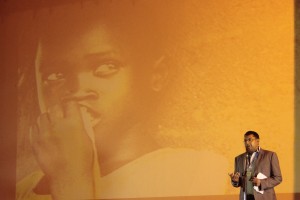 Elijah (pictured left) was the first boy in his village in rural Uganda to go to school. But seven years later, on the last day of Primary School, Elijah was unable to write a paragraph, read anything more than the simplest of sentences, or add and subtract. His father, dismayed that his son had failed so dramatically, walked to the school to visit the teacher and demand some answers. He said, “you failed me and you failed my son. I thought his life would be better than mine if he had an education”. And the teacher replied, “the son of a donkey will always be a donkey”.
Elijah (pictured left) was the first boy in his village in rural Uganda to go to school. But seven years later, on the last day of Primary School, Elijah was unable to write a paragraph, read anything more than the simplest of sentences, or add and subtract. His father, dismayed that his son had failed so dramatically, walked to the school to visit the teacher and demand some answers. He said, “you failed me and you failed my son. I thought his life would be better than mine if he had an education”. And the teacher replied, “the son of a donkey will always be a donkey”.
Such bad teachers are of course an anomaly in Uganda. But this story is a reflection of a problem facing many children across the world: lack of quality education in the classroom that leads to many pupils leaving primary school without being able to read, write or solve a simple mathematical problem. Quality education was also set as one of the new Sustainable Development Goals by the United Nations, who have identified that, although the number of children going to school has increased, levels of literacy levels in many countries have actually deteriorated.
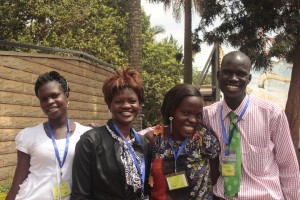 It is this problem that the Teacher Changemaker network in Uganda, led by STIR Education, aims to address. The network is designed for teachers to share ideas and innovations, as well as to provide a source of motivation for participants in what can be a difficult working environment. African Revival’s Jumpstart! team has been helping STIR to manage the network in Nwoya district, and recently accompanied 28 Teacher Changemakers to the annual STIR network summit in Kampala. Held in the ‘Wonderland’ complex in the grounds of the International University of East Africa, over 1,000 teachers attended the summit to receive certificates attesting to their hard work as Changemakers and to listen to talks by several keynote speakers, including government representatives from the Ministry of Education and Ugandan motivational speaker Fagil Musa Mandy.
It is this problem that the Teacher Changemaker network in Uganda, led by STIR Education, aims to address. The network is designed for teachers to share ideas and innovations, as well as to provide a source of motivation for participants in what can be a difficult working environment. African Revival’s Jumpstart! team has been helping STIR to manage the network in Nwoya district, and recently accompanied 28 Teacher Changemakers to the annual STIR network summit in Kampala. Held in the ‘Wonderland’ complex in the grounds of the International University of East Africa, over 1,000 teachers attended the summit to receive certificates attesting to their hard work as Changemakers and to listen to talks by several keynote speakers, including government representatives from the Ministry of Education and Ugandan motivational speaker Fagil Musa Mandy.
The speeches on the day were varied and inspiring. Many of the speakers focused on the characteristics of a Changemaker, highlighting that change first starts with the individual and that the teachers must make an effort to foster qualities such as discipline and efficiency in themselves as a prelude to change in the classroom. The Commissioner of Private Education emphasised the necessity of good habits: “If you want to be change agents, you must change yourselves first. Make it a habit that whatever God has given you to do, you do it with all your heart, all of your strength and all of your love. Learn to have good habits of time management, of working, of not missing classes.”
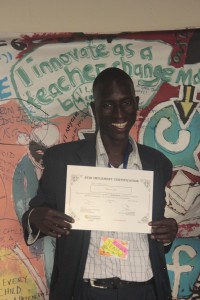
Gino (right), a nursery teacher from Purongo Hill Primary School in Nwoya district, reaffirmed this lesson after the conference: “The change begins with me the teacher. If I want to teach others, I really must have the courage to identify where my own weaknesses are, so I can begin a new journey of growth as both an individual, and an educator”
There was also an emphasis on rebranding the role of the teacher. In Uganda, the teaching profession has lost its prestige and is considered by many an undesirable role due to the meagre salary and often isolated posts in rural schools. But STIR wants to challenge the negative perceptions of educators and promote teaching as a noble, valuable profession – and teachers as powerful agents of change.
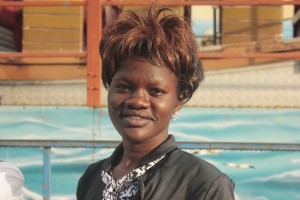 The summit was a perfect opportunity to reaffirm the values of the network and celebrate the hard work of the participating teachers to instigate change in their schools and communities. The Teacher Changemaker network encourages teachers to identify problems in their school and create ‘micro-innovations’ to address them – in collaboration with their fellow Changemakers, with whom participants can share, discuss and analyse ideas. Irene (left), a nursery teacher from Anaka Primary School explains the process: “One of us may ask, ‘what can we do to help this child’. So we sit down and share together, and discuss what we should do? Everyone contributes their opinion and then we put the ideas together and work hand in hand to reach a solution. We first discuss, then problem solve.”
The summit was a perfect opportunity to reaffirm the values of the network and celebrate the hard work of the participating teachers to instigate change in their schools and communities. The Teacher Changemaker network encourages teachers to identify problems in their school and create ‘micro-innovations’ to address them – in collaboration with their fellow Changemakers, with whom participants can share, discuss and analyse ideas. Irene (left), a nursery teacher from Anaka Primary School explains the process: “One of us may ask, ‘what can we do to help this child’. So we sit down and share together, and discuss what we should do? Everyone contributes their opinion and then we put the ideas together and work hand in hand to reach a solution. We first discuss, then problem solve.”
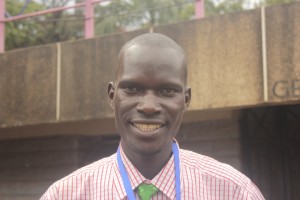 Sunday (right), a 22 year-old teacher from Lacek Primary School in Nwoya district, identified his pupils’ home environment as a major obstacle to learning. Sometimes parents show little interest in their children’s education and do not save the necessary funds to pay school fees and purchase scholastic materials. So Sunday decided to start a Village Savings and Loans Association (VSLA) for the parents: “My micro-innovation is that I am bringing parents closer to my school through a Village Savings and Loans Association. They come and save money together, and also monitor their children in class, which helps to improve educational performance.”
Sunday (right), a 22 year-old teacher from Lacek Primary School in Nwoya district, identified his pupils’ home environment as a major obstacle to learning. Sometimes parents show little interest in their children’s education and do not save the necessary funds to pay school fees and purchase scholastic materials. So Sunday decided to start a Village Savings and Loans Association (VSLA) for the parents: “My micro-innovation is that I am bringing parents closer to my school through a Village Savings and Loans Association. They come and save money together, and also monitor their children in class, which helps to improve educational performance.”
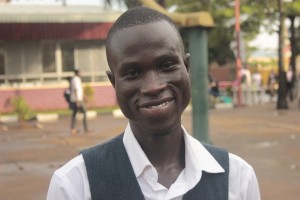 The network also encourages participation from local leaders, working across the system and targeting different layers of society to ensure that the approach is holistic, inclusive and instigates change at every level. Without ‘permission to innovate’ from parents and district officials, STIR Education CEO Sharath Jeevan acknowledged that their approach may not be effective. Stephen, a teacher from Nwoya central agreed: “Improving a child’s learning is not the responsibility of only one person. It is for all stakeholders, like the local leaders, the parents, the teachers and everybody in the community.”
The network also encourages participation from local leaders, working across the system and targeting different layers of society to ensure that the approach is holistic, inclusive and instigates change at every level. Without ‘permission to innovate’ from parents and district officials, STIR Education CEO Sharath Jeevan acknowledged that their approach may not be effective. Stephen, a teacher from Nwoya central agreed: “Improving a child’s learning is not the responsibility of only one person. It is for all stakeholders, like the local leaders, the parents, the teachers and everybody in the community.”
However the purpose of the summit in Kampala was primarily to celebrate the efforts of the teachers themselves to bring quality education to the classroom. Fagil Musa Mandy encapsulated their importance to Uganda perfectly in his powerful speech, when he said: “It is teachers who help to make the child’s dream clearer and let it grow. The only profession that opens hearts and makes them grow into flowers is the teacher”.
Posted in News | Tagged Africa, African Revival, Changemaker, Education, Gulu, inspiration, International Development, Jumpstart!, Kampala, STIREducation, Uganda | Leave a comment
Kilimanjaro: the climb of a lifetime!
January 8, 2016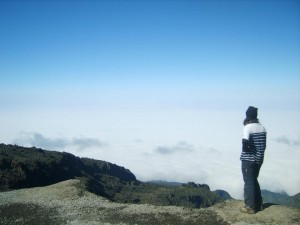 A procession of lights, burning like candles in the black of the night, is winding its way up the side of the final peak. It is reassuring to see the lights, a sign that the long road to the summit is well travelled. I look up to the roof of Africa – shaded in luminous tones of grey and silver under the glow of a full moon – and feel the weight of the challenge to come.
A procession of lights, burning like candles in the black of the night, is winding its way up the side of the final peak. It is reassuring to see the lights, a sign that the long road to the summit is well travelled. I look up to the roof of Africa – shaded in luminous tones of grey and silver under the glow of a full moon – and feel the weight of the challenge to come.
It is summit night, and my group is just about to set-off. Our guide woke us up at 1 am and eased us into a waking state with warm cups of hot chocolate, salted popcorn and sweet porridge. We do a final check to make sure we have all the necessary equipment and provisions, adjust our many layers to protect us against the cool of the night – and we’re off !
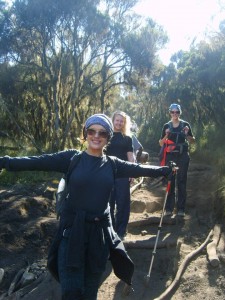 Its been a long journey to this point – and not just geographically. I started fundraising almost a year before the trip, organising a black-tie ball for my community, which proved a great success ! I sold tickets in advance for £10 a pop, which instantly raised a lot of money. On the night, after an interactive presentation of the challenge and charitable cause, a band played while I sold cakes and raffle tickets. I received some very generous donations and, equally as important, my guests had a great time ! It took hard work and sustained effort to raise the money, but the satisfaction of reaching the final goal was worth it, especially since the funds were going to such a good cause – in this case an education project in Tanzania that aimed to improve school infrastructure.
Its been a long journey to this point – and not just geographically. I started fundraising almost a year before the trip, organising a black-tie ball for my community, which proved a great success ! I sold tickets in advance for £10 a pop, which instantly raised a lot of money. On the night, after an interactive presentation of the challenge and charitable cause, a band played while I sold cakes and raffle tickets. I received some very generous donations and, equally as important, my guests had a great time ! It took hard work and sustained effort to raise the money, but the satisfaction of reaching the final goal was worth it, especially since the funds were going to such a good cause – in this case an education project in Tanzania that aimed to improve school infrastructure.
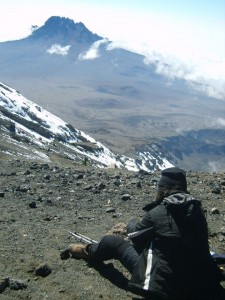 The Kilimanjaro adventure also marks my first voyage out of Europe ! This seemed a little daunting at first, but the great thing about doing a challenge like this, is that you are surrounded by people in exactly the same situation. I became very close to my fellow climbers. We supported each other first during the fundraising stage, then on the plane to Kenya and finally all the way up to the top. Together, we all failed to contain our excitement as we caught the first glimpse of majestic Kilimajaro from the bus. We shared our successes, our fears, our first Tanzanian meal – by summit night, I had made friends for life. And those friends count when you’re on the side of the highest mountain in Africa !
The Kilimanjaro adventure also marks my first voyage out of Europe ! This seemed a little daunting at first, but the great thing about doing a challenge like this, is that you are surrounded by people in exactly the same situation. I became very close to my fellow climbers. We supported each other first during the fundraising stage, then on the plane to Kenya and finally all the way up to the top. Together, we all failed to contain our excitement as we caught the first glimpse of majestic Kilimajaro from the bus. We shared our successes, our fears, our first Tanzanian meal – by summit night, I had made friends for life. And those friends count when you’re on the side of the highest mountain in Africa !
Since starting the climb six days ago, we have hiked through a stunning range of unique ecosystems. First, we came to dense rainforest, high canopy ceilings accentuating the echoing cries of the wildlife – monkeys, insects, birds of every size and colour – that call the biome home. The tall, elegant trees shrink to squat shrubs on the second day, huddled together in dense masses across a foggy landscape. But the scenery opens up again once we reach the moorland, with its wide horizons of peaty soil covered with heather, bracken and moss. Here, the air is clear and crisp and views across an ocean of clouds are breath-taking. Towards the end of the hike, we cross over into another dimension – a bizarre desert moonscape, inhospitable, with sludge grey dunes of dust that stretch as far as the eye can see. At night, temperatures drop to below freezing point, and I’m infinitely grateful I brought that extra sleeping bag liner ! And while the temperatures don’t rise, the dismal landscape slowly lifts, transforming into a snowy wonderland and signalling that we have reached the beginning of the end; the base of the highest peak and the final push to the summit…
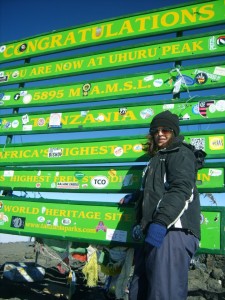 We are half way up now. I try to maintain a meditative state of mind, focusing solely on the steady flow of my breath and the swinging coattails of the person in front. We round a corner just in time to see the rising sun. Somebody plays ‘Circle of Life’, from the Lion King, on their phone while we admire the golden hues of light illuminating the vast planes of the African Savannah. I expect a dramatic cliff to take us to the top of Kilimanjaro, but in reality, the climb is the opposite – a gradual incline that requires infinite endurance, a strong body and even stronger mind to conquer. I briefly falter and want to turn back, but the wonderful porters urge me on, one taking my bag, the other offering me some sweetened tea. Their compassion makes all the difference, because before long I see a flash of green amidst white glacier – the signpost marking the summit. The relief of reaching the top is almost overwhelming, and I try to savour the beauty of the scene, viewed from the roof of Africa.
We are half way up now. I try to maintain a meditative state of mind, focusing solely on the steady flow of my breath and the swinging coattails of the person in front. We round a corner just in time to see the rising sun. Somebody plays ‘Circle of Life’, from the Lion King, on their phone while we admire the golden hues of light illuminating the vast planes of the African Savannah. I expect a dramatic cliff to take us to the top of Kilimanjaro, but in reality, the climb is the opposite – a gradual incline that requires infinite endurance, a strong body and even stronger mind to conquer. I briefly falter and want to turn back, but the wonderful porters urge me on, one taking my bag, the other offering me some sweetened tea. Their compassion makes all the difference, because before long I see a flash of green amidst white glacier – the signpost marking the summit. The relief of reaching the top is almost overwhelming, and I try to savour the beauty of the scene, viewed from the roof of Africa.
Posted in News | Tagged African Revival, endurance, Kilimanjaro, Tanzania | Leave a comment
Get into the Christmas spirit with Masasewee, Maxwell and Mercy in Zambia!
December 23, 2015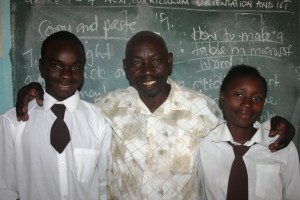 Who is starting to feel festive? We’d love to introduce to you to a family who is really getting into the Christmas spirit! Meet Masasewee and his grand-children: Maxwell and Mercy, both 15. Maxwell, Mercy and their six younger sisters have been living with Masasewee and their grand-mother Chipoca since their parents sadly passed away three years ago.
Who is starting to feel festive? We’d love to introduce to you to a family who is really getting into the Christmas spirit! Meet Masasewee and his grand-children: Maxwell and Mercy, both 15. Maxwell, Mercy and their six younger sisters have been living with Masasewee and their grand-mother Chipoca since their parents sadly passed away three years ago.
Maxwell and Mercy are both in Grade 8 at Bwacha Basic School, an African Revival supported school within the town of Kalomo, Zambia. Masasewee, a retired policeman, actually founded the school back in 2006, and currently still serves as the school’s PTA chairman! Unsurprisingly, his grand-children are extremely proud of him! Mercy told us: “We like our school; the teachers are good to the pupils-they teach us how to live in the future and explain things we don’t know. We are very proud of him- he does good work! He helps people in the community- making bore-holes and things like that.” However, that Masasewee’s passion for education and his local community has rubbed off on his grand-children, as Maxwell told us that his greatest Christmas wish this year is for “our school to have even more pupils so that even more children in our community can be educated”.
Although their house is already pretty full, the family enjoy celebrating Christmas with others, especially relatives, neighbours and friends! As Mercy explained, normally on Christmas day “we usually go to church and pray and worship and then come home, and make a small party at home. We cook special foods like rice, chicken and bread, and we buy nice drinks like sodas”. The children’s grandmother Chipoca normally takes charge of the preparations, but all the girls are always at her side to help chop vegetables, season dishes, and serve drinks! Mercy and her sisters particularly enjoy making cakes together, and preparing the potatoes. Even Maxwell pitches in and washes the plates once everyone has finished eating!
Aside from enjoying this wonderful feast with loved ones, what is the family hoping for this Christmas and for the New Year? Mercy told us that “I wish all the people in the world can celebrate, and remember what the day means-Jesus was born!” As for Maxwell, his wish is that “our community continues to cooperate together, so that we can build up a better town”. Finally, their grand-father shared his Christmas wish with us: “as a guardian and as a PTA chairman, I would be happy if the school could be sustained and that we could build a new classroom. That would be good. As for Zambia, at the moment, things are hard, things are expensive especially those who are not working so we are hoping things will change for the better next year.”
We would like to wish Masasewee, Maxwell, Mercy and their entire family a very happy Christmas, and we hope that all their dreams and aspirations for 2016 come true!
Posted in News | Leave a comment

